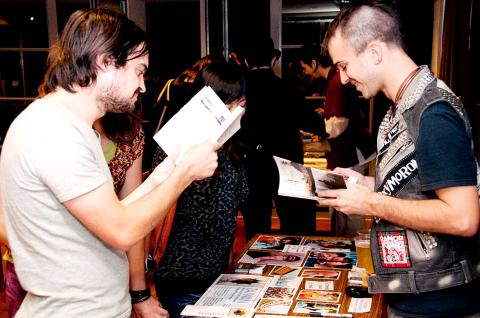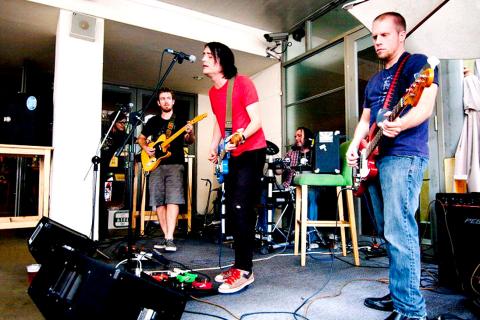Shawn May and Felicia Rodrigues have a plan to liven up a Saturday afternoon in Taipei. The expat artists are holding Exposure, an outdoor art fair that takes place tomorrow in the courtyard of Taipei Artist Village (台北國際藝術村百里廳).
May, who has lived in Taiwan for two and a half years, sums up Exposure as the perfect day of leisure. “What’s better than great art, live music, excellent food and a day drinking in the sun?” he told the Taipei Times.
May and Rodrigues initially started Exposure as a way to showcase their work, as well as that of like-minded artists. May specializes in gig posters and T-shirt design. Rodrigues says she left Toronto for Taiwan three and a half years ago because she was looking for “inner growth and experience.”

Photo courtesy of Felicia Rodrigues
“When I first came to Taiwan, I really didn’t know what was going on in the art scene,” she said. “But since moving here, my art has blossomed and I’m quite impressed with what Taiwan has brought out of me.”
The pair held the first Exposure in June last year to rave reviews, which led to a second one in October. The event also features live music (tomorrow there will be four acoustic artists). They met only shortly before the first event, but quickly clicked as a team.
“We split the duties to get everything ready,” May said. “Felicia is fantastic in dealing with all the artists. She handles getting all of their deposits [for the venue]. I deal with the venue and making sure we get all the right equipment lined up. I’m the nuts-and-bolts guy; she’s the people person.”

Photo courtesy of Felicia Rodrigues
The DIY effort behind the event has been personally gratifying for Rodrigues.
“Many artists, myself included, had never done an art show or gallery, so there were many questions to answer,” she said. “As I was checking out the artists’ profiles, I was truly amazed and inspired with everyone’s skills. I got to meet a lot of amazing people that had interesting thoughts and ideas. Bringing together 22 artists is a little nerve-racking and hard work, but worth it in the end. It makes me happy to see that the reason Exposure was created is reality.”

That US assistance was a model for Taiwan’s spectacular development success was early recognized by policymakers and analysts. In a report to the US Congress for the fiscal year 1962, former President John F. Kennedy noted Taiwan’s “rapid economic growth,” was “producing a substantial net gain in living.” Kennedy had a stake in Taiwan’s achievements and the US’ official development assistance (ODA) in general: In September 1961, his entreaty to make the 1960s a “decade of development,” and an accompanying proposal for dedicated legislation to this end, had been formalized by congressional passage of the Foreign Assistance Act. Two

Despite the intense sunshine, we were hardly breaking a sweat as we cruised along the flat, dedicated bike lane, well protected from the heat by a canopy of trees. The electric assist on the bikes likely made a difference, too. Far removed from the bustle and noise of the Taichung traffic, we admired the serene rural scenery, making our way over rivers, alongside rice paddies and through pear orchards. Our route for the day covered two bike paths that connect in Fengyuan District (豐原) and are best done together. The Hou-Feng Bike Path (后豐鐵馬道) runs southward from Houli District (后里) while the

March 31 to April 6 On May 13, 1950, National Taiwan University Hospital otolaryngologist Su You-peng (蘇友鵬) was summoned to the director’s office. He thought someone had complained about him practicing the violin at night, but when he entered the room, he knew something was terribly wrong. He saw several burly men who appeared to be government secret agents, and three other resident doctors: internist Hsu Chiang (許強), dermatologist Hu Pao-chen (胡寶珍) and ophthalmologist Hu Hsin-lin (胡鑫麟). They were handcuffed, herded onto two jeeps and taken to the Secrecy Bureau (保密局) for questioning. Su was still in his doctor’s robes at

Mirror mirror on the wall, what’s the fairest Disney live-action remake of them all? Wait, mirror. Hold on a second. Maybe choosing from the likes of Alice in Wonderland (2010), Mulan (2020) and The Lion King (2019) isn’t such a good idea. Mirror, on second thought, what’s on Netflix? Even the most devoted fans would have to acknowledge that these have not been the most illustrious illustrations of Disney magic. At their best (Pete’s Dragon? Cinderella?) they breathe life into old classics that could use a little updating. At their worst, well, blue Will Smith. Given the rapacious rate of remakes in modern